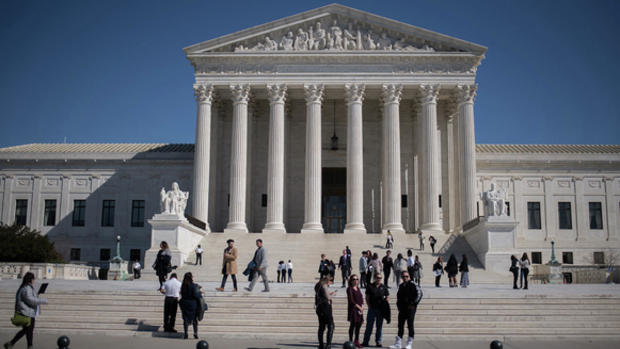Supreme Court Says Public Sector Workers Can’t Be Forced to Pay Dues to Unions They Aren’t Members Of

Visitors stand outside the U.S. Supreme Court in Washington on Feb. 27, 2018. MUST CREDIT: Bloomberg photo by Ron Antonelli.
You’d think, in a free country, that free citizens could choose for themselves which organizations they wish to align themselves with and pay dues to.
For instance, if you like what the National Rifle Association does, you can choose to be a member and give them money. If you don’t like that group, you can eschew both membership and dues.
But more than forty years ago the U.S. Supreme Court ruled that public sector workers could be obligated to pay dues to unions even if they aren’t members of that union. Even if they disagree with that union’s approach to collective bargaining deals. Even if they disagreed with the union’s stances on political candidates and issues.
Today the Supreme Court reversed that precedent finding that an Illinois law forcing union dues on non-union members working in government is unconstitutional. “Under Illinois law, public employees are forced to subsidize a union, even if they choose not to join and strongly object to the positions the union takes in collective bargaining and related activities,” Justice Samuel Alito wrote in the majority opinion. “We conclude that this arrangement violates the free speech rights of nonmembers by compelling them to subsidize private speech on matters of substantial public concern.”
Critics of the ruling are upset, and if you listen to them closely you can understand that this isn’t really about representing workers so much as the political money and clout which flows to left wing causes from public sector unions and their previously captive memberships:
BEHIND TODAY’S JANUS DECISION: a deep-pocketed network of conservative donors, led by DICK UIHLEIN, funded a systematic assault on public sector unions that culminated in today’s SCOTUS ruling. It will dramatically diminish labor’s $, & political muscle. https://t.co/vKqwJWlXmT
— Kenneth P. Vogel (@kenvogel) June 27, 2018
This is a great victory for freedom of choice.
Unions who want to attract members must now offer those members something they value in return rather than just relying on laws to force dues payments.
Of course, this ruling has little impact on North Dakota or other “right to work” states which have no laws forcing union dues on non-union workers.




